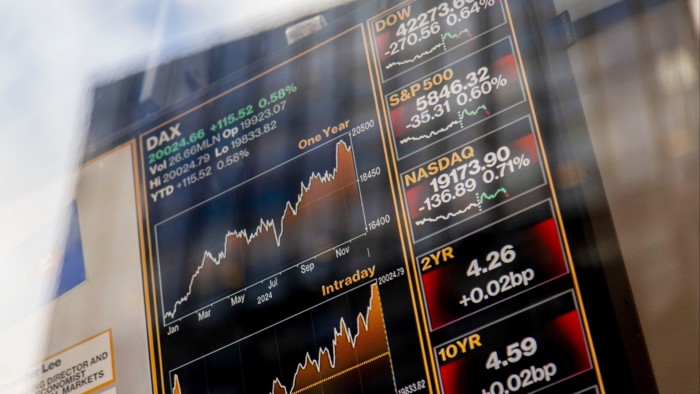Some of the UK’s biggest pension providers saw record flows into sharia-compliant funds last year following much better returns than their default products.
National Employment Savings Trust (Nest), the UK’s state-backed pension scheme, drew more than £180mn into its sharia fund last year, boosting assets under management by around a third.
Meanwhile People’s Partnership’s sharia fund almost doubled in size in 2024, as investors were drawn to the fund which delivered a return of 30 per cent, while Aviva added a sharia multi-asset fund to its self-select pension offering.
Sharia funds, which eschew investments that violate tenets of the Islamic faith, have outperformed their default peers over the past decade — and notably last year — owing to their heavy exposure to US technology stocks.
In 2024, European flows into Islamic global equity funds were more than twice as large as any other year in the past decade, according to data from Morningstar.
“[Last year] was a particularly impressive year,” said Dan Mikulskis, chief investment officer of People’s Partnership, with a sharia fund that returned almost 30 per cent. He added that a flurry of new investors “could be partly due to non-Muslim members of the scheme being attracted to the fund’s past performance”.
Islam’s sharia law forbids the charging of interest and earning income from gambling, tobacco and alcohol, among other “haram” business activities. Portfolios must be certified by specialist boards of Islamic scholars, who screen investments within sharia indices on the basis of their business activities and their debt, cash and interest-based income levels to determine whether they are compliant.
“This creates slight biases — for example, private equity is very difficult [to invest in] because of the leverage, [but] tech companies tend to pass the screens,” said Chris Redmond, head of manager research at pensions consultancy Willis Towers Watson.
Sharia indices are reviewed periodically and non-compliant securities are removed.
A portion of the dividends from the remaining investments — in line with the amount of money they make from prohibited activities — is often donated to charity, explained Maya Marissa Malek, chief executive of Amanie Advisors, which provides guidance on Islamic investments.
Redmond said that a regulatory push to serve all pension savers, together with a growth in the size of defined contribution pension schemes, had spurred providers to improve their provision in recent years.
“DC pension schemes are the biggest game in town, and as those schemes grow larger, they have more bandwidth to take the time to find a sharia-compliant scheme,” said Redmond.
The UK has been at the forefront of sharia fund investment in part because of its large British Muslim population.
In 2022, Uber’s UK pensions provider launched a new sharia fund following the threat of legal action from a trade union. NOW Pensions, one of the UK’s largest pension plans, created its sharia fund after the App Drivers & Couriers Union said it would take Uber to court over the issue. The union said the lack of a sharia option had made the pension scheme “effectively . . . inaccessible” for Uber’s Muslim-majority workforce.
HSBC Asset Management, among the largest providers of Islamic funds globally, said that UK DC pension schemes held $5.3bn of its flagship Islamic Global Equity Index Fund’s $7.3bn in assets under management, as of September 30 2024.
“There’s been a notable pick-up in interest over the past five to six years, in line with the broader interest in ethical investing,” said Sefian Kasem, head of investment specialists, ETF strategy, at HSBC Asset Management.
The “lion’s share” of new flows into Islamic global equities “went into broad passive equity funds, reflecting trends we see in the broader market,” added Kenneth Lamont, strategist at Morningstar.
Pension experts say that sharia funds’ high exposure to groups of similar stocks presents a risk. Nest, the UK’s state-backed pension scheme with its own £620mn sharia fund, said it feared the vehicles were “too concentrated” in “US-based technology stocks” and would eventually require “cushioning as stock markets can be volatile and incur losses during downturns”.
Nest’s sharia fund has delivered annualised returns of 15 per cent over the past decade, compared with 7 per cent for the pension scheme’s “starter” fund and 9 per cent for its “higher risk” fund. But the sharia fund has been relatively volatile, including an 8 per cent decline in 2022.
Redmond, the pensions consultant, said that “in the context of global equities, the universe is more constrained than non-sharia funds, but it’s still pretty diversified — there are [several hundred] companies you can invest in. When you get to some of the other asset classes, you need to be a bit more cautious because the universe becomes quite small”.



